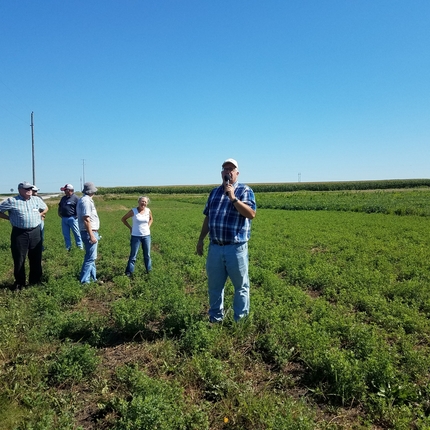By Lacie Dotterweich, former staff member
In this Iowa water quality blog series, we highlight Iowa farmers and water quality stakeholders to offer a variety of viewpoints and potential solutions. The first and second blogs focus on Don and Bill Swanson, of Ottumwa, Iowa, and Francis Thicke, of Fairfield, Iowa.
If there is one thing everyone can agree on, it’s that water quality improvement practices are key to solving Iowa’s water problem.
Aaron Lehman, a fifth generation farmer in Polk City, and president of the Iowa Farmers Union, has found using water quality practices on his farm to be extremely beneficial. Aaron and his family operate a small farm where nearly half of the acres are organic, and the remaining are conventional.
On Aaron’s farm, nearly all of the acres are seeded with cover crops. In addition, he utilizes grassed waterways and buffers to intercept water runoff. His organic acres on their own are also excellent for water quality management.
A study published by Sustainable Agriculture Research found organic farming methods can be a big help to water quality. Researchers discovered that nitrate loss due to runoff in conventional fields was twice as high as in organic fields. This is due to the greater capacity for water and soil nutrient retention–a result of diversified crops and changes such as cover crops and manure application.
Organic farming isn’t for everyone, but there are dozens of conservation and water quality practices for producers to choose from, depending on what will work best on their land.
“We’ve done a very good job of investigating what things work for Iowa’s land, and there are a lot of different, creative things Iowa farmers are doing,” Aaron said.
He believes the big challenge is figuring out how to implement more practices. The solution can’t only be on the shoulders of the farmers, who are already struggling with the poor farm economy.
“Right now, in bolt-tightening mode, it’s hard to make changes to existing practices,” Aaron said. “But, you have to choose to make those changes despite the tough economic conditions because it will help your farm in the long term.”
Not only is education and outreach to farmers extremely important, but Aaron believes water consumers should bear some of the responsibility as well.
“We have to be realistic, that to get a sizable investment into land and water quality, it will take an investment from the whole community,” Aaron said.
This investment may look something like Iowa’s Water Land and Legacy, which is a trust fund that allocates three-eighths of one-cent revenue from the next sales tax increase to permanently fund the state’s natural resources.
“Iowa taxpayers said the next time we raise sales taxes it would go toward natural resources and water quality, and that should be a step we should take as a state,” Aaron said.
As farmers continue to adopt conservation practices to improve water quality, strong policy will also be needed to accelerate progress. Water warriors, like Aaron, can’t fix our state’s problems on their own.
Feature photo: This summer, Aaron Lehman speaks at a field day about his organic soybeans. | Photo by Lacie Dotterweich





